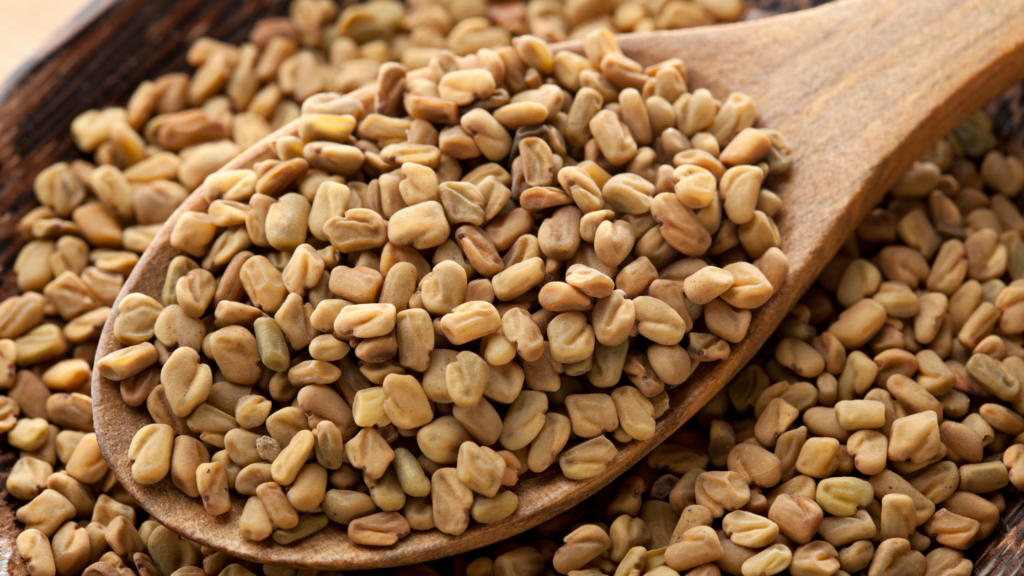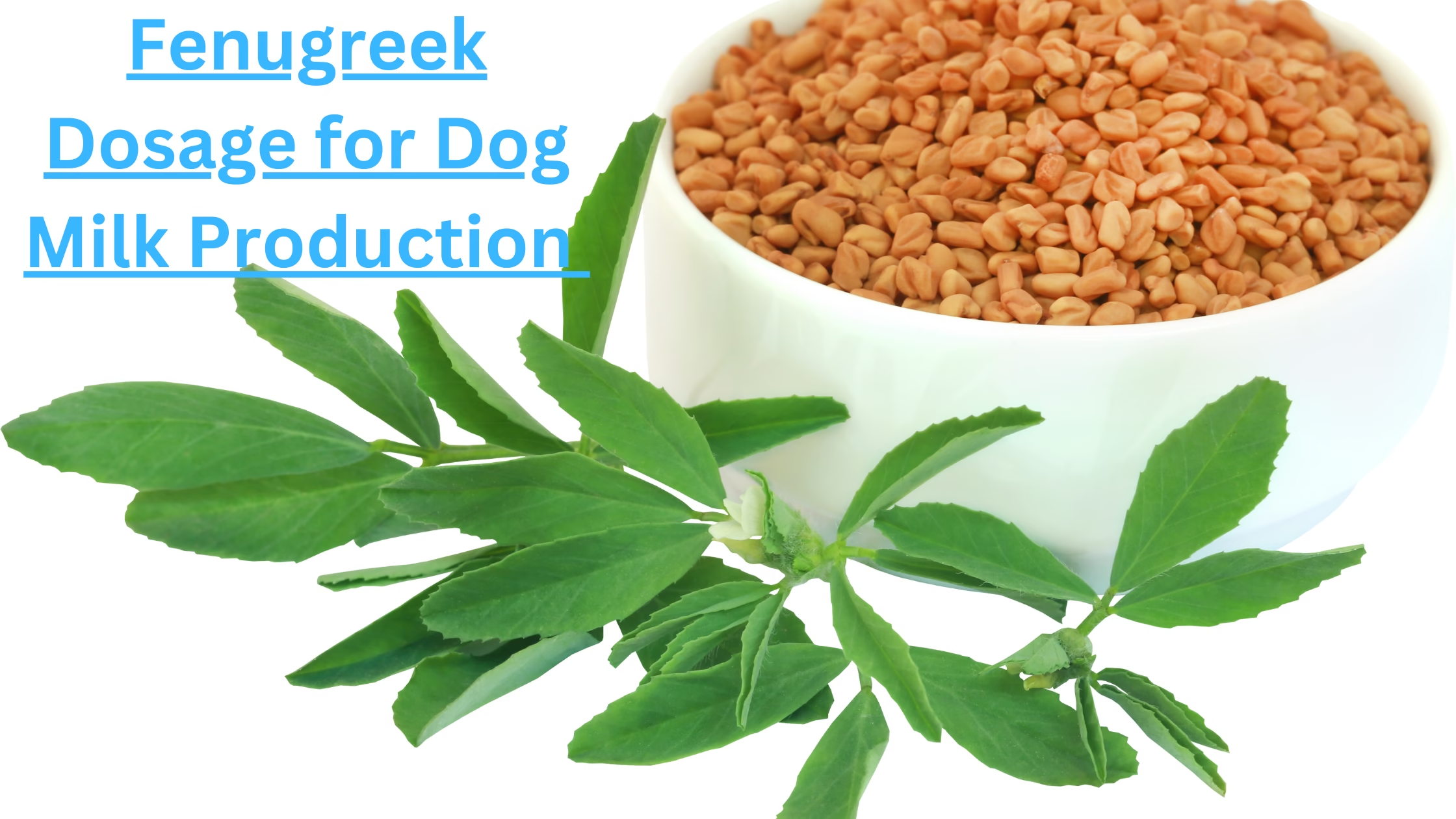Fenugreek Dosage for Dog Milk Production – Nursing dogs are vital in nurturing their newborn puppies, providing them with the essential nutrition for their growth and development.
However, some dogs may experience difficulties producing adequate milk, which can concern the mother and her puppies. This is where fenugreek, a remarkable herbal supplement, emerges.
Fenugreek has gained popularity for its potential to stimulate milk production in nursing dogs.
Derived from the Trigonella foenum-graecum plant, fenugreek has been used for centuries in traditional medicine for various purposes, including enhancing lactation in humans and animals.
The primary goal of this article is to provide a comprehensive guide on fenugreek dosage for dog milk production.
Whether you are a concerned dog owner or a breeder seeking solutions, understanding the benefits and proper usage of fenugreek can help you support your nursing dog in producing ample milk for her puppies.
So, let’s delve into the fascinating world of fenugreek and explore how this herbal supplement can make a positive difference in dog milk production.
Understanding Fenugreek and its Benefits for Dog Milk Production

A. What is Fenugreek and its Origin?
Fenugreek is a herb from the Fabaceae family and is scientifically known as Trigonella foenum-graecum.
It has a long history of use in traditional medicine and culinary practices, originating from the Mediterranean region and Asia.
Fenugreek seeds are commonly used in cooking, but the herb also possesses remarkable medicinal properties.
B. The Beneficial Properties of Fenugreek for Stimulating Milk Production
Fenugreek contains various bioactive compounds that contribute to its milk-boosting capabilities.
One of the key components is diosgenin, a plant-derived compound that mimics the effects of estrogen in the body.
This estrogenic activity helps stimulate the production of prolactin, the hormone responsible for milk synthesis in mammals, including dogs.
Additionally, fenugreek is rich in phytoestrogens, plant compounds resembling human estrogen.
These phytoestrogens can bind to estrogen receptors and promote milk gland development and milk production in nursing dogs.
C. Potential Reasons for Low Milk Supply in Nursing Dogs
Several factors can contribute to low milk supply in nursing dogs, causing concerns for the mother and her puppies. These may include:
1. Insufficient stimulation: Adequate stimulation of the mammary glands is crucial for milk production.
If the puppies aren’t suckling properly or the mother is separated from her litter too frequently, it can hinder milk production.
2. Nutritional imbalances: A lack of proper nutrition or an unbalanced diet can negatively impact milk production in nursing dogs.
Providing the mother with a well-balanced diet that meets her nutritional needs during lactation is essential.
3. Hormonal imbalances: Hormonal fluctuations or disruptions in the mother’s body, such as insufficient prolactin levels, can affect milk production.
In such cases, fenugreek can help by stimulating the release of prolactin and supporting milk synthesis.
Understanding these potential reasons for low milk supply in nursing dogs allows us to recognize the importance of supporting and enhancing milk production through natural means, such as fenugreek supplementation.
By harnessing the beneficial properties of fenugreek, we can assist nursing dogs in producing the nourishing milk their puppies need for optimal growth and development.
Determining the Correct Fenugreek Dosage for Dog Milk Production

A. Factors to Consider for Accurate Dosage
1. The Weight of the Dog: Adjusting Dosage Based on Weight
When determining the appropriate fenugreek dosage for your dog, it’s essential to consider their weight.
Larger dogs may require a higher dosage compared to smaller ones.
This is because body weight can influence the metabolism and absorption of the herb.
To ensure accurate dosing, following weight-based guidelines provided by veterinarians or reputable sources like us is recommended.
2. The Dog’s Health Condition: Consulting a Veterinarian
Before administering fenugreek or any other supplement to your dog, it is crucial to consult a veterinarian.
They can evaluate your dog’s overall health, assess existing medical conditions, and provide personalized guidance on fenugreek dosage.
This ensures the safety and well-being of your dog and helps prevent any potential interactions with other medications or health concerns.
3. The Dog’s Nursing Demands: Higher Dosages for Larger Litters
The size of the dog’s litter can influence the demand for milk production. Larger litters require more milk to adequately nourish all the puppies.
In such cases, the fenugreek dosage may need to be adjusted to support increased milk production.
It’s important to closely monitor the nursing demands and observe if the mother dog is producing enough milk to meet the needs of her litter.
Working with a veterinarian can provide valuable insights into the appropriate dosage adjustments for specific situations.
Considering these factors, you can determine the correct fenugreek dosage for your dog’s milk production needs.
Remember, every dog is unique, and individual responses may vary.
It is always advisable to seek professional advice to ensure the optimal health and well-being of your nursing dog and her puppies.
B. Fenugreek Dosage Guidelines for dogs per kg
When determining the fenugreek dosage for a nursing dog, it’s important to consult with a veterinarian for personalized guidance.
However, here is a general guideline for fenugreek dosage based on the weight of the nursing dog:
1. For dogs weighing 1-5 kg (2-11 lbs): Start with a dosage range of 200-400 mg of fenugreek daily.
2. For dogs weighing 5-15 kg (11-33 lbs): Begin with a dosage range of 400-800 mg of fenugreek daily.
3. For dogs weighing 15-25 kg (33-55 lbs): Start with a dosage range of 800-1200 mg of fenugreek daily.
4. For dogs weighing 25-35 kg (55-77 lbs): Begin with a dosage range of 1200-1600 mg of fenugreek daily.
5. For dogs weighing 35+ kg (77+ lbs): Start with a dosage range of 1600-2000 mg of fenugreek daily.
Please note that these dosages are general recommendations and should be used as a starting point.
It’s crucial to consult with a veterinarian who can consider your dog’s specific health condition, age, and other individual factors to determine the most appropriate and safe dosage.
Your veterinarian will have the expertise and knowledge to provide personalized advice, ensuring your nursing dog’s and her puppies’ well-being.
C. Fenugreek Dosage Guidelines for dogs per Day
When dosing fenugreek for dog milk production, it is essential to establish a consistent routine. Here are some dosage guidelines per day:
1. Start with a Low Dosage: The lowest recommended dosage based on your dog’s weight, as mentioned in the previous section.
This allows you to gauge your dog’s response and tolerance to fenugreek.
2. Gradually Increase Dosage: If you observe no adverse effects or improvements in milk production after a few days, you can gradually increase the fenugreek dosage.
Add after every 3-4 days until you find the dosage that yields positive results.
3. Split Dosage Throughout the Day: Divide the daily fenugreek dosage into two or three smaller doses. For example, the recommended daily dosage is 800 mg.
In that case, you can administer two doses of 400 mg or three doses of approximately 270 mg.
This ensures a consistent supply of fenugreek throughout the day.
4. Administer with Food: It is generally recommended to give fenugreek supplements with food to aid digestion and absorption.
Mix the fenugreek powder or capsules with your dog’s regular meals.
Remember, consistency is key when using fenugreek for dog milk production. Stick to the recommended dosage and administer it regularly throughout the day.
Monitor your dog’s milk production closely, and if you have any concerns or questions, consult your veterinarian for guidance.
How Long Does It Take for Fenugreek to Increase Milk Supply?

A. Timeframe for Observing Results in Dog Milk Production
After administering fenugreek to a nursing dog, it’s important to understand that the results may not be immediate.
Fenugreek may take a few days to a week to increase the milk supply.
However, this timeframe can vary based on several factors, including the dog’s response and overall health.
B. Individual Results and Influencing Factors
It’s essential to recognize that individual results may vary when using fenugreek to increase milk supply in dogs.
While some dogs may experience noticeable improvements within a few days, others may require more time to see significant changes.
Factors such as the dog’s overall health, genetics, nutritional status, and nursing demands can influence the speed and extent of milk production enhancement.
It’s also important to consider that fenugreek may not be effective for every dog.
While it has shown promising results for many, there can be instances where other underlying health issues or factors prevent fenugreek from having the desired impact.
In such cases, it is crucial to consult a veterinarian for a thorough evaluation and alternative approaches, if necessary.
C. Monitoring Milk Production and Seeking Veterinary Consultation
During fenugreek usage, dog owners should closely monitor the milk production of their nursing dog.
Keep an eye on the puppies’ size, health, and weight gain to ensure they are receiving adequate nourishment.
Suppose concerns about the milk supply or no noticeable improvements occur within a reasonable timeframe. In that case, it is advisable to consult a veterinarian.
Veterinarians can provide professional guidance based on their expertise and knowledge of your dog’s circumstances.
They can assess the milk production, evaluate the health of the nursing dog, and offer additional advice or alternatives if needed.
Your veterinarian will be able to provide the best course of action and support to ensure the well-being of both the mother dog and her puppies.
Remember, patience is key when using fenugreek to increase milk supply. While it can be an effective natural solution for many dogs, individual results can vary.
You can ensure optimal care and nutrition for your nursing dog and her puppies by closely monitoring and seeking veterinary assistance when necessary.
Potential Side Effects and Precautions
A. Possible Side Effects of Fenugreek on Dogs
While fenugreek is generally considered safe for dogs, it’s important to be aware of potential side effects.
These side effects are rare but can occur in some cases. Common side effects may include:
1. Gastrointestinal Upset: Dogs may experience mild digestive issues such as gas, bloating, or loose stools when initially introduced to fenugreek.
These symptoms usually subside as the dog’s system adjusts to the supplement.
2. Allergic Reactions: In rare cases, dogs may have an allergic reaction to fenugreek.
Signs of an allergic reaction can include itching, skin rashes, swelling of the face or limbs, difficulty breathing, or vomiting.
If any of these symptoms occur, immediate veterinary attention should be sought.
B. Importance of Monitoring the Dog’s Health and Adverse Reactions
It is crucial to closely monitor your dog’s health and well-being using fenugreek.
Keep a watchful eye for any adverse reactions, especially during the initial stages of supplementation.
If you notice any concerning symptoms or changes in behavior, discontinue fenugreek usage and consult your veterinarian.
Regularly observe your dog’s overall health, including their energy levels, appetite, and digestion.
Monitoring the puppies’ growth and development is also important to ensure they receive sufficient milk supply.
By paying attention to these factors, you can quickly catch any potential issues and seek prompt veterinary advice.
Also Read : Can Dogs Eat Babybel Cheese? Discover the Safety & Benefits
C. Discontinuing Fenugreek Usage and Consulting a Veterinarian
Suppose your dog experiences negative side effects or an allergic reaction to fenugreek. In that case, it is recommended to discontinue its usage immediately.
Contact your veterinarian for guidance and follow their instructions.
They may recommend alternative methods to support milk production or suggest further examination to address any underlying concerns.
Remember, each dog is unique, and their response to fenugreek may vary.
By being vigilant, observing any adverse reactions, and seeking professional guidance when needed, you can ensure the safety and well-being of your dog and her nursing puppies.
Always prioritize your dog’s health and consult a veterinarian before introducing new supplements or changing their diet.
Your veterinarian will provide personalized advice based on your dog’s needs and circumstances.
Fenugreek for Dogs: Dosage and Milk Supply Relationship
A. Addressing the Concern of Fenugreek Decreasing Milk Supply
There is a common concern among dog owners about whether fenugreek can decrease milk supply.
However, it’s important to clarify that fenugreek is generally used to increase milk production, not decrease it.
Fenugreek contains compounds that mimic estrogen and help stimulate the production of prolactin, the hormone responsible for milk synthesis.
B. Fenugreek: Generally Used to Increase Milk Production
The primary purpose of fenugreek supplementation in nursing dogs is to enhance milk supply.
It is believed to have lactogenic properties that support the development and function of milk-producing glands.
Many dog owners and breeders have used fenugreek to promote healthy lactation in nursing dogs and ensure an ample milk supply for their puppies.
C. Importance of Monitoring Milk Production
While fenugreek is known for its milk-boosting properties, it is important to closely monitor the milk production of the nursing dog during the supplementation period.
This allows you to assess the effectiveness of fenugreek and ensure that the milk supply is sufficient to meet the puppies’ nutritional needs.
Observing the puppies’ growth, weight gain, and overall health can gauge whether the fenugreek dosage supports optimal milk production.
If you have any concerns about the milk supply, consult your veterinarian. They can assess the situation, provide additional recommendations, and address potential issues.
Remember, fenugreek is generally used to increase milk supply, and monitoring the milk production is essential to ensure the well-being of the nursing dog and her puppies.
Maintaining a close eye on their health and seeking professional advice when needed can provide the best care for your dog and support a healthy nursing experience.
Conclusion
In conclusion, fenugreek can be a beneficial herbal supplement for increasing milk production in nursing dogs.
Throughout this article, we have explored various aspects of fenugreek dosage for dog milk production.
Here’s a recap of the main points discussed:
1. Fenugreek is an herb that has been used for centuries and is known for its lactogenic properties, making it a popular choice for stimulating milk production in nursing dogs.
2. When determining the correct fenugreek dosage for your dog, consider their weight, overall health condition, and the nursing demands of their litter.
3. We provided a general guideline for fenugreek dosages based on the dog’s weight. Still, it’s crucial to consult a veterinarian for personalized advice that considers your dog’s specific needs.
4. Consistency and gradual dosage adjustments are important. Start with a low dosage and gradually increase, if necessary, while splitting the daily doses.
5. Results may vary, and it may take a few days to a week to observe an increase in milk supply. However, closely monitor your dog’s milk production and the puppies’ health, and seek veterinary consultation if any concerns arise.
Remember, the health and well-being of your dog and her puppies should always be a priority.
Consulting a veterinarian for personalized advice and closely monitoring your dog’s health and milk production are essential to ensure their care.
If you found this information helpful, consider sharing this article with other dog owners who may benefit from it.
For further information or specific concerns, contact your veterinarian, who can provide tailored guidance based on your dog’s unique situation.
Together, let’s ensure that nursing dogs receive the support they need to provide their puppies with optimal nutrition and care.







